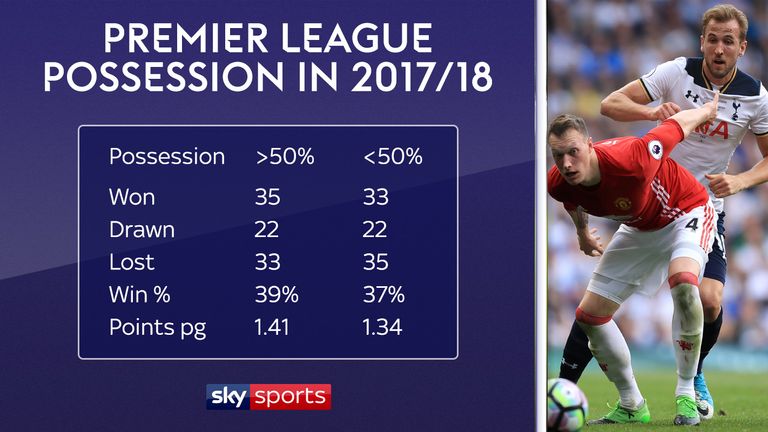Does possession really matter in the Premier League? The statistics

Thursday 26 October 2017 16:34, UK
Premier League results are putting the significance of possession in the spotlight. Does it matter? We take a look...
Possession. It has become one of more divisive debates in football. Nine-tenths of the law to some; a nonsense statistic of little value whatsoever to others. Every weekend of every season there are results and teams that become symbolic.
The success or otherwise of teams such as Manchester City and Leicester City now doubles as a referendum on its importance. But what do the statistics tell us about the value of possession?
On the face of it, the connection between possession and success could not be clearer. The teams that top the Premier League, La Liga, Bundesliga and Ligue 1 - Manchester City, Barcelona, Borussia Dortmund and Paris Saint-Germain respectively - all top the possession stats too. If Napoli win their game in hand they'll complete the set for Europe's top leagues.
And yet, delve a little deeper into the data and there is not the same clarity.
So far this season, the relationship between possession and points on a game-by-game basis is negligible. Of the 90 Premier League matches that have been played, 35 have been won by the team that had the most possession compared to 33 that were won by the side that saw less of the ball. In terms of points, it is 127 plays 121. Almost insignificant.
To put it another way, if the only information that you knew about a particular Premier League game was the possession statistics of the two teams involved, it would offer next to no clue whatsoever as to which of those sides won the game.
The link between quality chances - increasingly represented by the expected goals statistic - and results is a much stronger one. This better reflects the fact that there are different ways of opening up a team. The counter-attack can bring about better chances, just as dropping deep can limit the quality of opportunities offered up to the opposition.
West Brom, for example, dominated the ball in only two of their home games last season and they lost them. In contrast, they won nine of the 17 matches in which the opposition had the majority of possession, including a memorable 3-1 win over Arsenal in March. That match was a good example of the disconnect between possession and chances.
"Our performance against Arsenal with 23 per cent possession was exceptional," said West Brom's assistant Gerry Francis at the time. The former England captain had clearly been examining the numbers. "Our turnover and ability to break quickly and have 12 shots, eight on target, against their two, was excellent," he added.
Leicester became poster boys for this tactic in the 2015/16 season but they were not alone. In fact, they were one of 11 Premier League teams who picked up more points per game at home when they did not dominate possession than when they did. That season, 137 games were won by the team that had more possession and 131 by the team that did not.
Of course, these numbers are hugely influenced by the state of the game. The team that takes the lead is often likely to cede possession while the opponent pushes hard for an equaliser. But given the obvious trend for the more successful clubs to favour a possession game, a greater link between points and possession still might have been expected.
The best teams do have more of the ball. But these statistics suggest that enjoying the most possession in any one game is not necessarily the way to win it.
For more on this subject, tune in to The Debate live on Sky Sports Premier League from 10pm when Geoff Shreeves, Paul Merson and Andy Townsend will discuss the day's big talking points.





